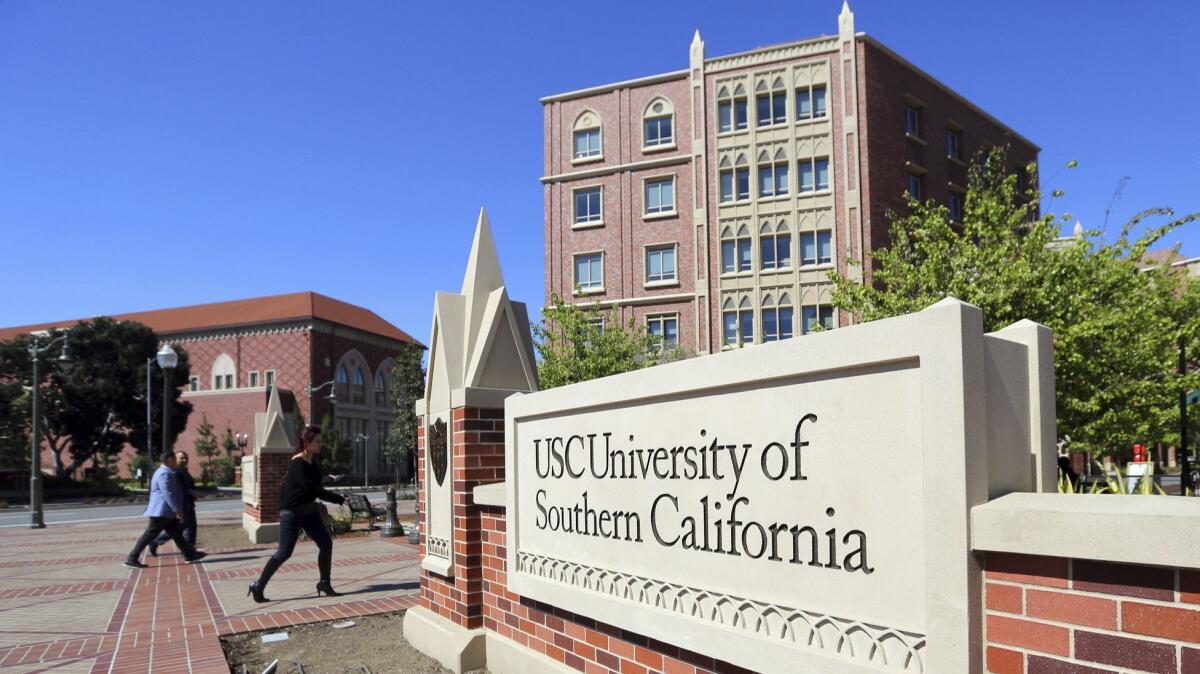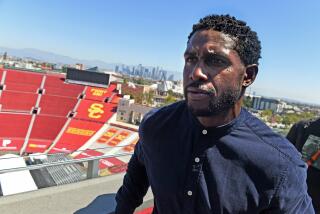How many students cheated to get into USC? A look inside the admissions investigation

Shortly after federal authorities took down a national college admissions scam in March, officials at USC launched their own investigation with emails to dozens of students.
They did not mince words: The school wanted to know whether the 33 students had lied on their applications to USC. Some of the students understood what was happening because their parents had been charged in the federal case. Others were in the dark.
The reason for the emails would soon become clear to them all. They had been linked to William “Rick” Singer, the confessed leader of the admissions con, and they now faced expulsion, depending on what university investigators discovered.
USC officials told students that decisions would come within weeks, according to lawyers representing several of the students. But the probe has turned into a protracted, fraught push by USC to clear its ranks of any students who were complicit in the trickery Singer carried out to sneak them into the highly selective school. So far USC has ruled on only a few students — clearing each of them of wrongdoing — while the rest wait in limbo to learn whether they will be kicked out.
“For an academic institution to discover you’ve effectively got academic fraud is sort of a stab in the heart,” Wanda Austin, who served the past year as USC’s interim president, said in a recent interview. . The investigations into the students, Austin said, are following “a very slow process, but it is a fair process … it’s diligent and it gives a student every opportunity to bring forth information to defend themselves.”
The student inquiry is at the center of a broader effort by USC to come to grips with the ways Singer infiltrated the campus. The school also screened tens of thousands of applicants vying for spots in next fall’s class for ties to Singer and scrutinized coaches and administrators in the athletic department for indications they participated in the bribery and cheating scheme.
In addition, USC has hired two outside firms to pick apart its admissions policies in order to learn, in Austin’s words, “how in the world did this happen?”
In the email notifications, the 33 students were given five days to contact USC’s Office of Professionalism and Ethics. When they did, they were told they had to come to the office for an interview within a week, according to several criminal defense attorneys hired by students to represent them in the quasi-judicial proceedings. Until students agreed to cooperate in the investigation, the university froze their enrollment at the school, preventing them from enrolling in new classes.
Requests to postpone interviews until after the year’s final exams and to review in advance evidence the school had collected were denied, said Josh Ritter, Vicki Podberesky and other attorneys who spoke on the condition their names not be used because they were not authorized to discuss their clients’ cases.
The interviews were tense and often emotional. One investigator would quietly take notes while another asked the questions. One by one, documents were pulled out of a binder or from a stack and placed in front of the student, the defense attorneys all said. The records included the student’s application to USC, high school transcripts and emails, often written by Singer or an alleged accomplice at USC, in which efforts to get the student admitted as a recruited athlete were discussed, the lawyers said.
Students were pressed on athletic achievements or extracurricular activities that investigators had not been able to independently verify, lawyers said. And students were grilled on what they knew of Singer and of the arrangements he allegedly had struck with their parents to present the students as accomplished athletes in exchange for large payments, according to the lawyers.
Slated for about an hour, the interviews often ran long. One stretched more than three hours, an attorney recounted. Afterward, students were allowed to submit a written defense, provide evidence in support of their case and request that certain people be interviewed.
The interviews were completed several weeks ago. Since then, the lawyers who spoke to The Times said they have heard little, if anything, from the university. While students wait, USC is not allowing them to withdraw so the school can note on their official transcripts if they are expelled or suspended.
Singer, a college admissions consultant who catered to wealthy families in Los Angeles, Silicon Valley and elsewhere, has pleaded guilty to several felonies stemming from the ploy he and several accomplices pulled off for years. Parents willing to pay six-figure fees could access the “side door” that Singer built into several colleges, where he bribed coaches to give up admission spots reserved for athletic recruits, Singer said in his plea hearing. He also acknowledged charging parents between $15,000 and $75,000 to have an expert take a student’s college entrance exams.
USC officials said they found evidence of both types of cheating among the students being investigated.
Much of USC’s focus has been on Donna Heinel, a top administrator in the athletic department who prosecutors allege was Singer’s main accomplice at the university. Heinel, who was fired the day she was arrested, has pleaded not guilty to allegations she knowingly helped usher in many of the students who were falsely portrayed as athletic recruits.
Austin said a picture has emerged of how Heinel allegedly managed to operate her part of the scam without detection. The coaches of each sport’s teams were allotted a certain number of admission slots for recruits each year and would give Heinel the names of applicants they wanted admitted, Austin explained. Before presenting the coaches’ choices to a committee of admissions officers for approval, Heinel allegedly would add the names and fabricated athletic resumes of Singer’s fake recruits, Austin said. Once the committee had signed off on the students, , Heinel is believed to have kept coaches in the dark by scrubbing the bogus athletes from any paperwork, Austin added.
Going forward, coaches will need to certify directly with admissions officers the names of recruits they want admitted, Austin said.
Nina Marino, an attorney for Heinel, said her client “vehemently denies any wrongdoing.”
By far, USC has been affected by the admissions scandal more than any of the other universities where Singer is known to have peddled his scam. The number of students flagged for connections to Singer dwarfs those at others schools. And, in addition to Heinel, 19 parents of current or former USC students and three coaches have been charged by federal prosecutors for allegedly conspiring with Singer.
After recent revelations that USC failed to confront other major crises, including a gynecologist who is accused of serially abusing students and a drug-addicted medical school dean, the admissions debacle is a chance for it to prove it is capable of holding its people accountable, said Rick Caruso, chair of the university’s Board of Trustees.
The quick firings of Heinel and coaches charged in the criminal case, along with the inquiry into the students, “send a strong message … there’s a new way of doing business and, folks, everyone is accountable for your actions. That’s the only way you can operate a place,” Caruso said in an interview with The Times.
A USC spokeswoman said reaching decisions has taken time, in part, because of the “thorough nature of the investigations and the many opportunities the students are given to view and respond to any new evidence as it comes in.” But in her comments to The Times, Austin placed some of the blame on defense attorneys, who she said were slowing the process because “what they don’t want to do is to get to the end of the process where there is a sanction.”
The claim was roundly rebuffed by the lawyers who spoke to The Times. They all fired back with a criticism of their own, saying that throughout the investigation school officials have not been clear about how the students will be judged.
“We were never told what they were looking for as far as what conduct crosses the line and what doesn’t,” Ritter said. “I wish they would have just spelled it out at the start. Is it enough simply for a student to have worked with Singer on his or her application, even if they didn’t know about other things Singer and their parents might have been doing? Are they drawing a hard line that any falsehood on an application will get a kid expelled, even if they didn’t know about it? We haven’t been told.”
Austin attempted to clarify the school’s stance to The Times. “We’re not judging them on what their parents did,” she said. If investigators find fraud occurred, the students will be judged on “whether they knew and actively participated.”
Austin added that even in cases in which students were unaware of the scheming Singer carried out on their behalf, USC could still impose discipline if officials conclude the cheating was so blatant that a “student should have known.”
Under these standards, the university so far has cleared “a handful” of the 33 students of misconduct, said Brenda Maceo, a USC spokeswoman. Citing students’ privacy rights, Maceo declined to give the actual number and said the university would not make public any of the upcoming decisions on the remaining students.
USC is well within its rights to investigate the students as it wishes, said Djuna Perkins, whose Massachusetts firm specializes in investigations conducted by universities and schools.
“Private schools are like a private club — and a private club can make up whatever rules it wants, as long as those rules don’t discriminate against a protected group,” she said.
Students, however, can fight a school’s decision.
Adam Semprevivo, one of the two students Georgetown University has moved to expel for links to Singer, has sued the school, alleging he was denied rights enshrined in a student handbook, which he contends carry the weight of a binding contract between the university and its students.
Semprevivo’s father has pleaded guilty to fraud conspiracy charges and admitted to paying $400,000 to secure his son’s spot at Georgetown by misrepresenting him as a top tennis recruit. The younger Semprevivo claims in his lawsuit that he had no knowledge of his father’s scheme and has asked the school to allow him to withdraw from the school with his credits intact.
At USC, students can appeal discipline decisions and then can file a lawsuit in Superior Court if they believe, like Semprevivo, that the school did not adhere to its own policies for investigating and disciplining students.
More than a dozen other universities launched reviews after Singer’s scam was exposed in March. Nearly all of them have turned up just one or two students with links to Singer.
A spokesman for UCLA, for example, said the school so far has flagged two students and one applicant who was admitted but did not enroll.
Chapman University would say only that federal prosecutors subpoenaed records for nine students in November, and that the school is “still evaluating if any action is needed.”
More to Read
Sign up for Essential California
The most important California stories and recommendations in your inbox every morning.
You may occasionally receive promotional content from the Los Angeles Times.











